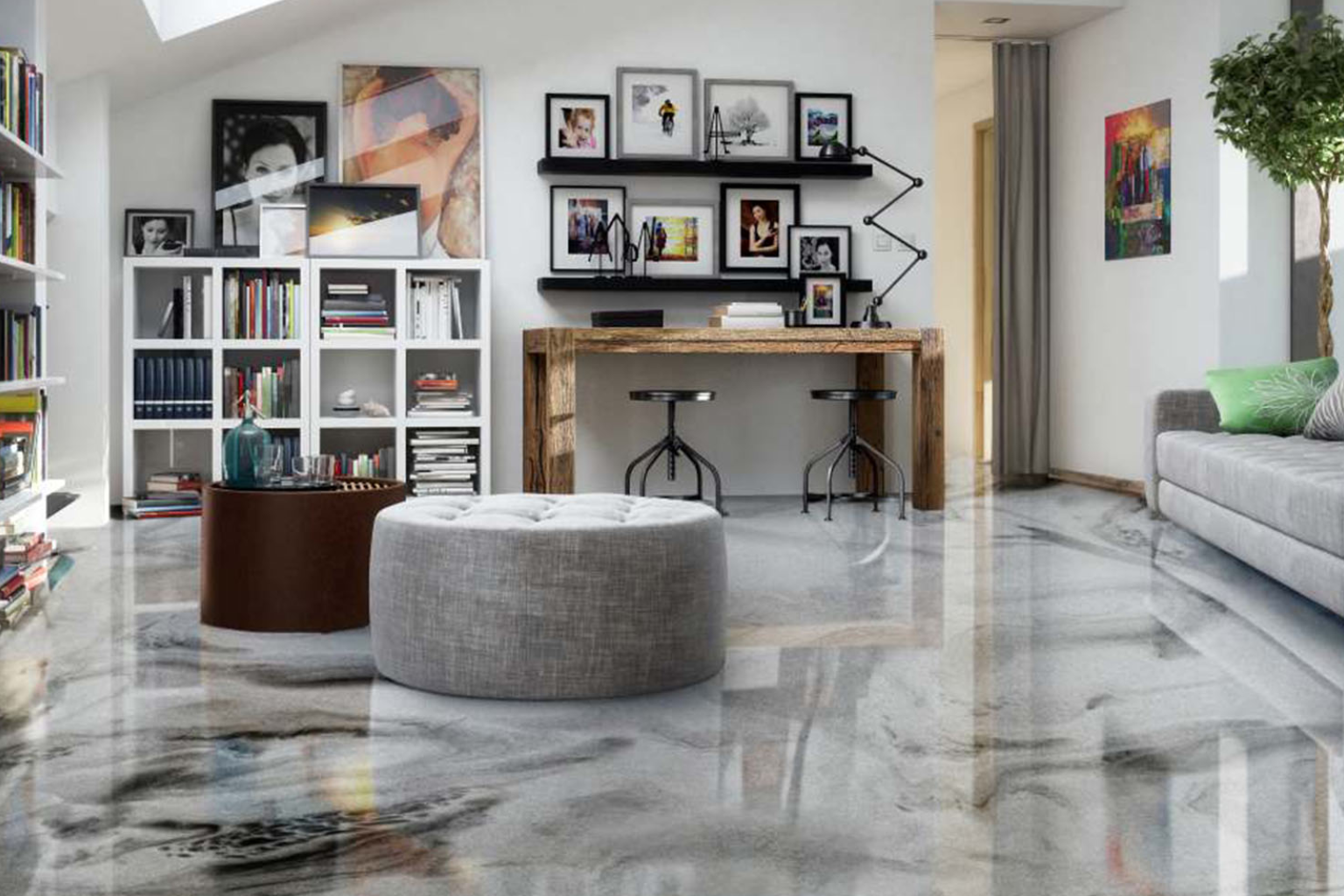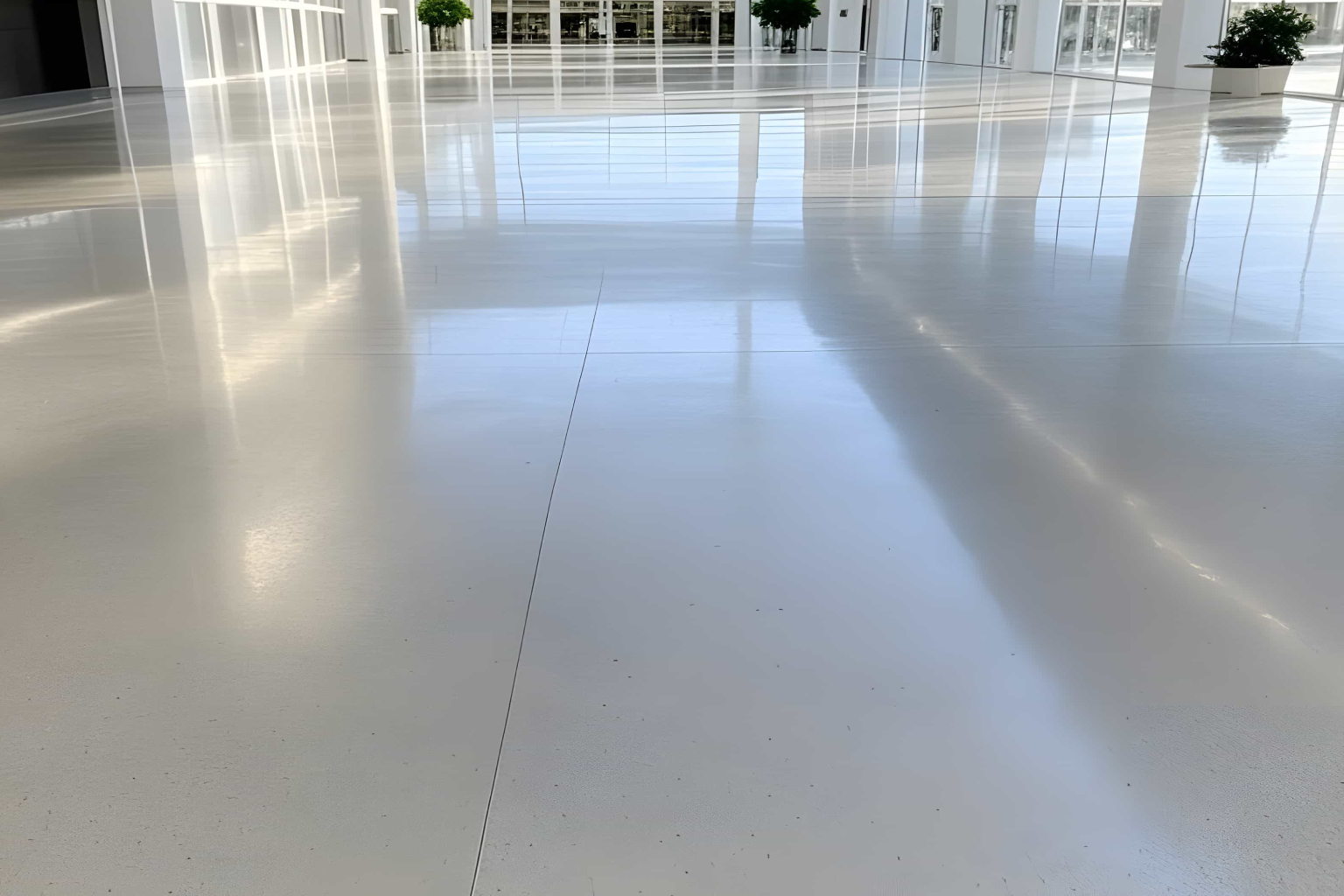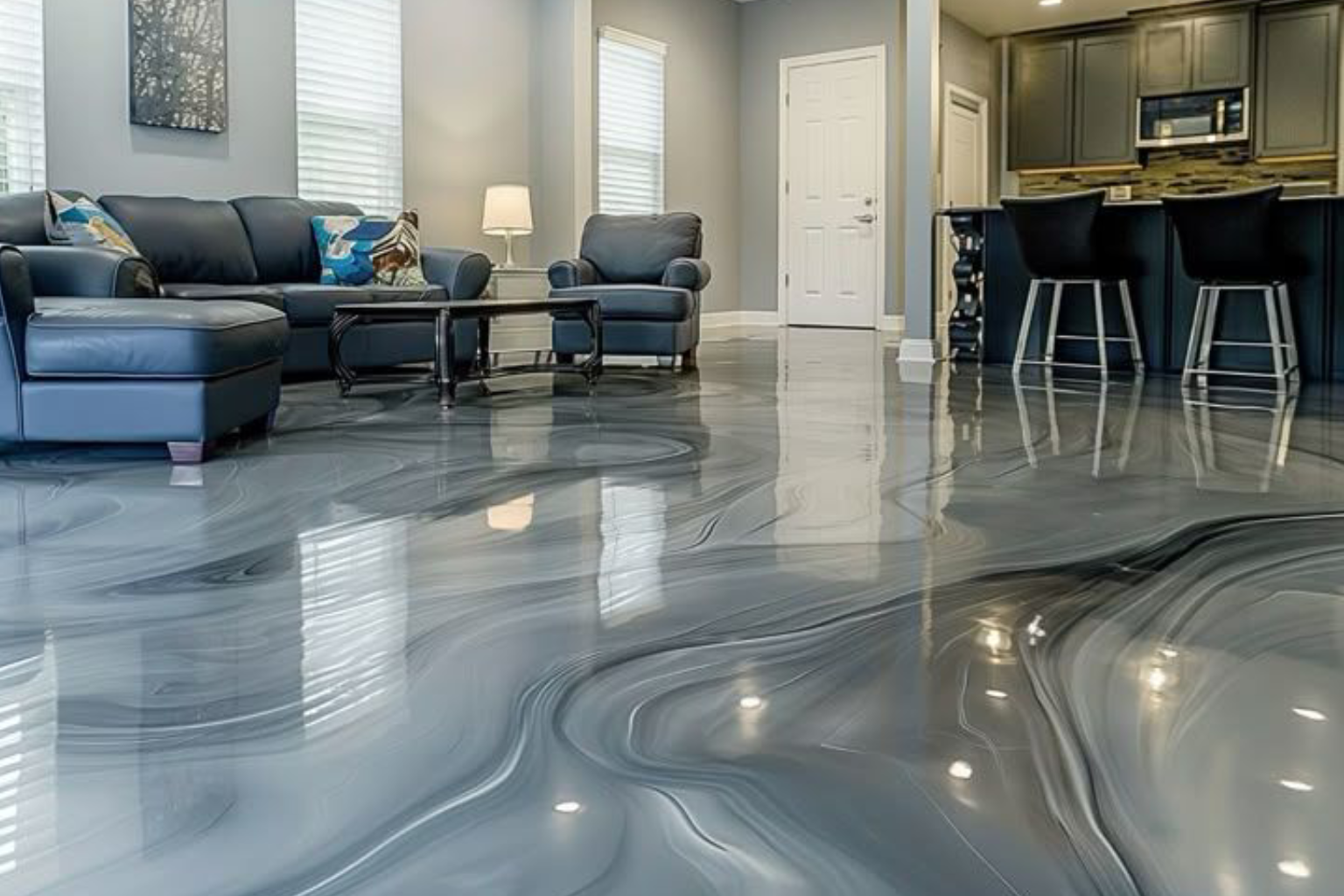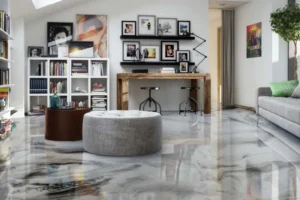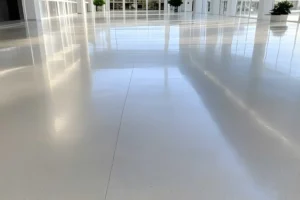Tired of your old garage floor or your dull basement slab that no longer serves the purpose? The solution is around the corner in the form of Epoxy Flooring.
Epoxy Flooring has become the talk of town for quite a while, mainly due to its high durability, low-maintenance and aesthetic appeal. But what exactly is it and what makes it a worthwhile investment for your space?
This comprehensive guide is here to walk you through everything. It explains to you what epoxy flooring really is. Then it explores epoxy’s incredible features and its exceptional types. Moreover, it helps you choose the right contractor and exactly what to expect during the installation process.
Epoxy Floor: Let’s Break Down the Basics
At its simplest, epoxy flooring is made by mixing two main ingredients. One is resin and the other is hardener. When they’re blended together, they react. And once that reaction sets in, they cure into one solid layer that sticks tightly to your concrete floor. The result?
You’ve got a rock-solid, glossy surface. This mainly handles all the spills, dropped tools, and heavy foot traffic life throws at it.
Garage? Basement? Warehouse? Workshop? No matter the spot. Epoxy takes boring concrete and turns it into a smooth, shiny masterpiece. And, that’ll make everyone double-take.
Why Is Epoxy So Popular?
Epoxy flooring has taken the spotlight, and literally for good reason. Think of it as a floor with exceptional durability, charming appearance, and low maintenance. You can enjoy endless design possibilities as well, which range from bold metallic finishes to classic solid colors.
And surely, all this makes it a favorite in homes, businesses, and industrial spaces alike. Let’s explore a few points to see why more and more people are turning to epoxy for a flooring solution.
Unbeatable Durability
Life happens. There can be spills, accidents, and scuffs anywhere, anytime. Epoxy deals with all of it. It keeps your floor intact even with a drastic impact. In fact, it’s like your floor went through Marine boot camp and came back unbreakable.
Classic Aesthetics with Eye-Candy Looks
No more staring at dull, monotonous gray floors. Epoxy serves eye-candy looks with cool colors, diverse patterns, and metallic swirls. You’ve got options even if you’re going for classy, flashy, or something in between.
Low Maintenance with Seamless Surface
Spilled your coffee? Dropped a wrench? Easy fix. Epoxy has a seamless surface. It doesn’t trap dirt or dust. You just need a quick sweep, light mop, and you’re good. In fact, your cleaning bucket might start feeling a little lonely with this flooring.
Chemical Spill Protection
Brake fluid, oil, and cleaning chemicals. Whatever it is, epoxy eats that stuff for breakfast. And yes, that’s not an exaggeration. That’s why it’s a favorite in garages, hospitals, and factories where spills are just part of the deal.
Longevity? Worth Every Penny
Sure, epoxy costs more upfront. But when you think about the payoff? Years of hassle-free floors. Consequently, you won’t have to worry about repairs or touch-ups.
Epoxy Floor Types for Every Space Design
Not every space needs the same kind of floor, and that’s where epoxy really shines. It is incredibly versatile. Now you can enjoy different types designed to fit your specific needs.
Quartz Epoxy Floors
Epoxy is mixed with quartz grit for extra traction and durability. These floors are perfect for kitchens or hospitals where slipping ain’t an option.
Metallic Epoxy Coatings
Want folks to stop and stare? Metallic epoxy gives you crazy 3D swirls. It’s just like you poured liquid metal on the floor. Which is why it’s ideal for showrooms and high-end garages.
Solid Epoxy Floors
These simple yet sturdy stands feature a uniform, solid color and seamless finish, giving you a clean, polished look ideal for workshops and industrial settings.
Mortar Epoxy Floors
This one has heavy-duty, super-thick, tough epoxy flooring. All these make mortar floors great for warehouses and heavy-use industrial spots.
Polished Concrete Floors
Sleek and contemporary charm. That’s what a polished concrete floor is about. Its tough and glossy surface works just as well in upscale homes as it does in commercial and industrial spaces.
Epoxy Flooring Applications
Epoxy flooring isn’t just for fancy garages. In fact, it works just about anywhere you need something strong, safe, and good-looking:
Garages & Basements
Epoxy Shine’s epoxy is recommended in high-traffic garages and basements since it handles oil spills and still looks sharp for years.
Restaurants & Kitchens
Epoxy flooring is suitable in busy commercial kitchens as it has a smooth, wipeable surface.
Medical Offices and Healthcare Setups
Epoxy is preferred for flooring in medical offices and healthcare setups because it is sterile and super easy to sanitize.
Warehouses & Manufacturing Plants
Epoxy floors are recommended in warehouses and manufacturing plants as they bear forklifts and heavy equipment.
Retail Spaces & Showrooms
Epoxys are suitable for busy retail spaces and showrooms because they have glossy, professional finishes.
How to Install Epoxy Flooring?
A top-tier epoxy floor ain’t just simple paint. Rather, it’s a detailed procedure that takes time and precision. Here is the step-by-step overview of how epoxy floor installation occurs:
Concrete Groundwork
Firstly, the floor needs to be spotless. That’s why we start with the removal of dirt, oil, or old coatings. Then, we fill in and smooth out the cracks and chips. After that, we mechanically grind or blast the surface. All this prep gives the epoxy something solid to grip onto.
The Primer Coating
The next turn is the primer coating. It’s important. It seals the concrete and locks everything in place. It’s just like laying the perfect foundation before you initiate building a house.
Epoxy Base Application
Now that’s the fun part. The base coat goes down using rollers or squeegees. You can make this step more creative by adding color flakes or metallic effects. Whatever really makes your floor stand out.
Protective Topcoat Application
We apply a clear, protective topcoat once everything’s in place. And this is the exact step to give you a shiny floor. Moreover, it also protects the floor from stains and scratches.
The Curing Process
This step is really important. The epoxy hardening. And, it needs time for that. However, we don’t know exactly how much. It can be a full day or even a week. Rushing this step can affect durability. That’s why we let it cure fully before anyone walks or drives on it.
Points for Picking the Right Epoxy Contractor
It’s a reality that a great epoxy floor doesn’t happen by accident. The installer you hire plays a huge role in how your floor turns out. And, we don’t mean just how it looks on day one, but how it holds up years down the road.
So before you spend your hard-earned money, here’s what you should be watching for:
They Know Epoxy Inside and Out
You don’t want someone who “also does epoxy.” You want a contractor who specializes in it. Someone who’s done this dozens (or hundreds) of times in the past. In fact, epoxy floors require a unique skill set. This isn’t a weekend DIY project.
They Have Real Proof of Their Work
Any reputable contractor should have plenty of photos of past jobs. Ask to see them. The good ones will be proud to show off their work.
They Follow Industry Standards
Make sure they’re trained and using professional-grade products. The ones that meet industry regulations. Shortcuts here often lead to problems down the line.
No Hidden Fees
You deserve to know exactly what you’re paying for. A professional won’t give you vague estimates or “we’ll see” pricing. In fact, he will give you a clear, detailed quote upfront.
Happy Customers Tell the Story
Good reviews are gold. Read what past clients have to say. Or better yet, ask for references you can actually speak to.
They Stand Behind Their Work
A solid warranty says a lot about a contractor’s confidence in their work. In case they’re not willing to back it up, you should probably keep looking.
Final Thoughts
This comprehensive guide is all you need to know before you jump into epoxy flooring. Because, at the end of the day, epoxy flooring isn’t just some trendy upgrade. Rather, it’s a game-changer for those sick of boring and high-maintenance floors.
Sure, it doesn’t just come with good points. There are a few things to think about. But that’s exactly why guides like this exist. So that you know what you’re gonna get.
And when you’re ready to make the change. Epoxy Shine is here to turn your vision into reality. No more headaches, no more guesswork. Just solid, gorgeous floors you’ll be showing off for years!
FAQs
Is epoxy flooring expensive?
Epoxy flooring isn’t exactly pocket change. However, it’s not gonna break the bank either. Prices usually land somewhere between $4 to $12 per square foot, depending on the design, materials, and prep work involved.
Go basic, and it’s affordable. But, you’ll pay a bit more in case you go fancy with metallic swirls.
How long do epoxy floors last?
With epoxy, you’re getting long-term service. These floors can easily hold up for 10 to 20 years when done right. And, sometimes even longer if you baby them a bit.
In fact, a little routine care keeps it looking sharp for years. So yeah, it’s built to go the distance.
Where can I find the best epoxy flooring company in New Jersey?
If you’re hunting for the real deal in New Jersey, Epoxy Shine has got your back. They’re not just some regular crew. If truth be told, they’re literally the experts.
They offer friendly service with no salesy nonsense policy. Consequently, you get top-notch work done in an affordable range.
What are the cons of using epoxy for flooring?
Epoxy isn’t perfect for everyone. Like everything, it has cons too. First off, the concrete needs to be properly prepped. Otherwise, the whole thing can peel later.
It’s also a bit picky about the weather. This can mess with the curing process. Lastly, it can get really expensive for those wanting fancy metallic or custom designs.
Which one is cheaper, tiling or epoxy flooring?
Basic tile work usually starts a bit cheaper than epoxy, depending on the material. However, fancy porcelain or custom patterns are way more expensive.
Epoxy is generally more costly than basic tiles. Again, it depends on how flashy you go with flakes or custom designs. But here’s the kicker is that tiles can crack, and repairs add up fast. In contrast, epoxy often saves you money in the long term.



